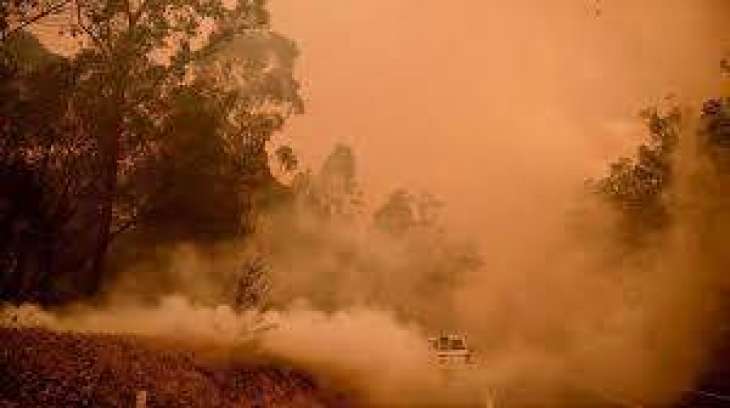Australian Prime Minister Scott Morrison has announced 3,000 reserve troops will be deployed to help tackle raging bushfires across the country.Defence Minister Linda Reynolds said this is the first time this has happened in Australia's history.
Canberra (Pakistan Point News / Online - 04th January, 2020) Australian Prime Minister Scott Morrison has announced 3,000 reserve troops will be deployed to help tackle raging bushfires across the country.Defence Minister Linda Reynolds said this is the first time this has happened in Australia's history.Temperatures have surpassed 40C (104F) in parts of south-east Australia. Officials had warned that Saturday was set to be a "dangerous day".Since September, fires in Australia have killed at least 23 people.
Speaking at a press conference on Saturday, Mr Morrison told reporters: "We have seen this disaster escalate to an entirely new level."An emergency warning was issued for areas of eastern Victoria that told remaining residents it was now too late to leave."The safest option is to plan how you will safely take shelter indoors as conditions worsen," the warning said, adding: "Leaving now would be deadly."Residents were instructed to attempt to take shelter indoors or in a large clearing or body of water.
Dozens of people are missing and some 1,500 homes have already been lost this fire season.Morrison also announced A$20m (�10m) has been allocated to lease four water bomber planes. Defence force bases would provide temporary accommodation, he said.Authorities in south-east Australia are bracing for a weekend of high temperatures and strong winds, which are threatening to worsen bushfire conditions across the country.What is the situation on Saturday?In Victoria, three fires have converged overnight becoming a 6,000-hectare blaze.
The state has already declared a disaster in areas that are home to some 100,000 people and it had urged residents to leave. Twenty-one people remain unaccounted for in Victoria.Residents in areas under emergency warning have now been told they cannot leave. Areas affected include parts of the Snowy Mountains.Phone lines are down in some areas of the state,On Friday, the Australian navy evacuated some 1,000 tourists and residentswho were trapped in the fire-ravaged town of Mallacoota on the Victoria coast.
The first evacuees arrived in the Mornington Peninsula on Saturday morning.Another ship, HMAS Adelaide, will set sail from Sydney on Saturday and will be located offshore ready to evacuate citizens from the coast if needed.In the state of South Australia, two people have died in a bushfire on Kangaroo Island.A quarter of the island has been ravaged by fire. South Australia state premier Steven Marshall said much of Flinders Chase National Park had been "taken out" by bushfires.
New South Wales (NSW) has declared a week-long state of emergency. Tens of thousands of residents and holidaymakers were warned to evacuate coastal areas, where a "tourist leave zone" has been declared.NSW Rural Fire Service Commissioner Shane Fitzsimmons has warned Saturday will be "a long and difficult day for everybody".More than one hundred fires are currently burning in NSW and, according to Mr Fitzsimmons, more than half are not contained.
"We know the fires we've got already... but what we need to be vigilant about today as well is the prospect of any new fires that might start under these hot, dry, windy conditions," he said.Some 3,000 firefighters are on the ground in NSW, according to News.com.au.Near Batemans Bay, some 30,000 people have lost power. Power company Essential Energy says it is working to try and safely restore power, ABC News reports.Four emergency warnings have been issued in NSW.
Residents have been told to take shelter as the fire approaches.The fires in Australia began in September. In addition to the fatalities, they have so far destroyed more than 1,300 homes, as well as millions of acres of bushland.Meteorologists say a climate system in the Indian Ocean, known as the dipole, is the main driver behind the extreme heat in Australia.However, many parts of Australia have been in drought conditions, some for years, which has made it easier for the fires to spread and grow.Prime Minister Scott Morrison has been criticised for his handling of the bushfires. He has faced persistent accusations of being too absent, including by taking a holiday to Hawaii, and underplaying the role of climate change.In a news conference on Friday, he said he understood that people had "suffered a great lot" and were "feeling very raw".





